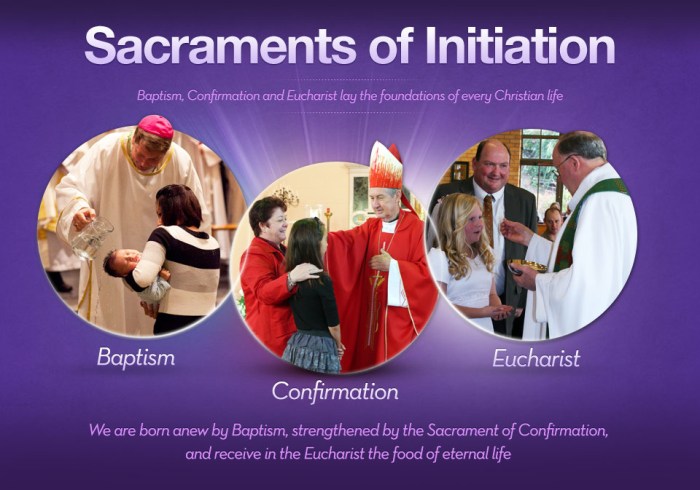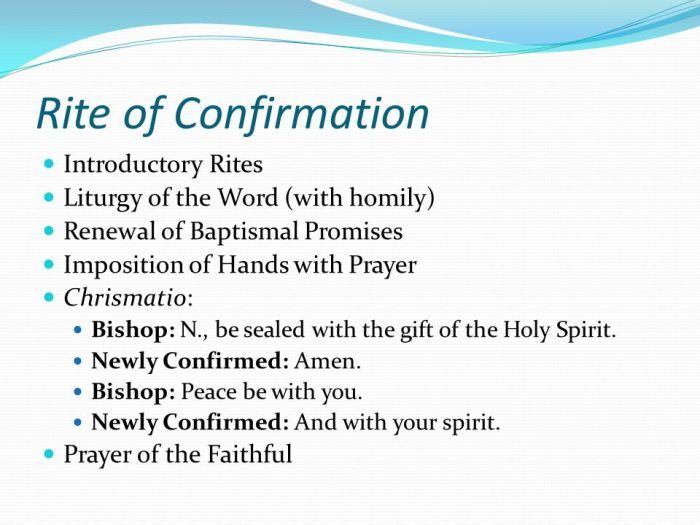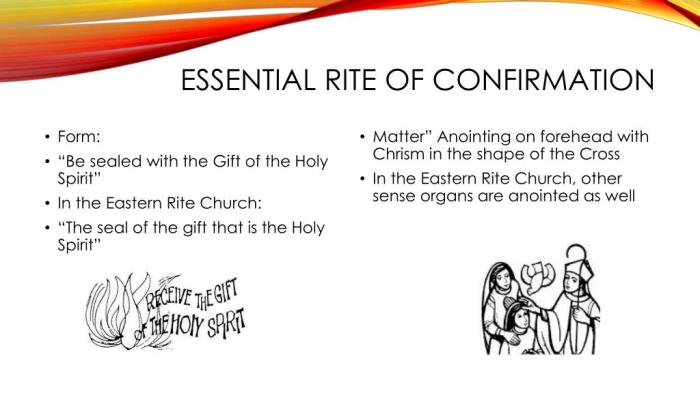Cuál es el rito esencial de la confirmación – At the heart of the Christian faith lies the sacrament of Confirmation, a pivotal rite that empowers the baptized to live as witnesses of Christ. This article delves into the essential rite of Confirmation, exploring its theological foundation, biblical origins, and profound symbolism, offering a comprehensive understanding of its significance and enduring legacy.
The essential rite of Confirmation holds immense theological and historical significance, tracing its roots back to the early Church. It is a sacrament administered exclusively by a bishop, who serves as the successor of the apostles and holds the authority to impart the Holy Spirit upon the candidates.
Essential Rite of Confirmation: Nature and Significance

The sacrament of Confirmation is a vital rite in the Catholic Church, conferring upon the baptized the fullness of the Holy Spirit. Rooted in the apostolic tradition, it completes the process of initiation into the Christian faith and strengthens the recipient’s bond with Christ.
Biblical and Historical Origins
- The origins of Confirmation can be traced back to the New Testament, where the apostles laid hands on the newly baptized to impart the Holy Spirit (Acts 8:14-17).
- The early Church Fathers, such as Tertullian and Cyprian, wrote extensively about Confirmation as a separate rite following Baptism.
Symbolism and Meaning
- Anointing with Chrism:The bishop anoints the forehead of the candidate with chrism, a mixture of olive oil and balsam, symbolizing the sealing of the Holy Spirit and the strengthening of the baptismal bond.
- Imposition of Hands:The bishop lays hands on the candidate, invoking the Holy Spirit and conferring the gift of fortitude.
- Words of Invocation:The bishop prays for the candidate to receive the seven gifts of the Holy Spirit: wisdom, understanding, counsel, fortitude, knowledge, piety, and fear of the Lord.
Role of the Bishop in Confirmation
The exclusive role of the bishop in administering Confirmation stems from the apostolic tradition. Bishops are considered the successors of the apostles and have the authority to confer the sacrament.
Theological and Historical Reasons
- The apostles were the first to lay hands on the baptized to impart the Holy Spirit.
- The early Church Fathers recognized the role of bishops as the successors of the apostles and entrusted them with the administration of Confirmation.
Responsibilities of the Bishop
- Preparing Candidates:The bishop ensures that candidates are properly instructed in the faith and have a personal understanding of the sacrament.
- Administering the Rite:The bishop performs the anointing, imposition of hands, and invocation during the Confirmation ceremony.
- Conferring the Gifts of the Holy Spirit:The bishop prays for the candidates to receive the seven gifts of the Holy Spirit.
Preparation and Reception of Confirmation

Candidates for Confirmation undergo a period of preparation to ensure their understanding and readiness.
Process of Preparation
- Instruction:Candidates receive instruction on the history, theology, and significance of Confirmation.
- Reflection:Candidates are encouraged to reflect on their faith and personal commitment to Christ.
- Spiritual Exercises:Candidates may participate in retreats or other spiritual exercises to deepen their relationship with God.
Significance of Personal Faith, Cuál es el rito esencial de la confirmación
The candidate’s personal faith and understanding are crucial for a meaningful reception of Confirmation. The sacrament strengthens the baptismal bond and empowers the individual to live as a witness of Christ.
Proper Way to Receive Confirmation
- Prayer and Preparation:The candidate should pray and prepare their heart before receiving the sacrament.
- Openness to the Holy Spirit:The candidate should be open and receptive to the gifts of the Holy Spirit.
- Devotion to Christ:The candidate should be committed to following Christ and living out the Christian life.
Effects and Graces of Confirmation

Confirmation bestows spiritual effects and graces upon the confirmed.
Strengthening of the Baptized
- Confirmation completes the process of initiation into the Christian faith.
- It strengthens the baptismal bond and empowers the individual to live as a true disciple of Christ.
Empowerment as Witnesses
- Confirmation empowers the confirmed to witness to their faith and share the Gospel with others.
- It gives them the courage and fortitude to defend the Christian faith.
Role of the Holy Spirit
The Holy Spirit is the primary agent in Confirmation. The sacrament is a powerful encounter with the Holy Spirit, who strengthens the individual and guides them throughout their Christian journey.
Contemporary Practices and Variations
While the essential elements of Confirmation remain the same, there are variations in the celebration of the sacrament across different cultural contexts.
Liturgical Forms
- Solemn Confirmation:Celebrated by the bishop during a Mass, with the candidate being anointed individually.
- Communal Confirmation:Celebrated outside of Mass, with the bishop anointing multiple candidates at once.
Cultural Adaptations
- Age of Confirmation:The age of Confirmation varies depending on the cultural context, from childhood to adulthood.
- Symbolic Gestures:In some cultures, additional symbolic gestures, such as the laying on of hands by sponsors, may be incorporated into the ceremony.
Importance of Essential Elements
Despite variations, the essential elements of Confirmation, including anointing with chrism, imposition of hands, and invocation of the Holy Spirit, must be maintained to ensure the integrity and validity of the sacrament.
Questions and Answers: Cuál Es El Rito Esencial De La Confirmación
What is the essential rite of Confirmation?
The essential rite of Confirmation involves the laying on of hands and anointing with chrism, accompanied by the invocation of the Holy Spirit.
Who administers the sacrament of Confirmation?
The sacrament of Confirmation is administered exclusively by a bishop, who represents the fullness of the apostolic ministry.
What are the effects of Confirmation?
Confirmation strengthens the baptized, empowers them to live as witnesses of Christ, and bestows upon them the seven gifts of the Holy Spirit.